The excellent Governor General Jean : Is she just the Canadian Liberal still in office?
Oct 15th, 2006 | By Citizen X | Category: Canadian Republic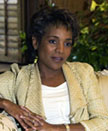 On the face of things the big Canadian political excitement this weekend is the last federal Liberal leadership debate in Toronto today, Sunday, October 15. But the 2006 race to lead the legendary old Grits – “Canada’s natural governing party” for at least about two-thirds of the 20th century – won’t quite catch fire (if it ever really does) until we’re closer to the actual Montreal convention vote, on December 2. Meanwhile, the first anniversary of the last Liberal prime minister’s appointment of Governor General Michaelle Jean has just come and gone. Unlike the rest of the fallen Paul Martin regime, the excellent Mme Jean remains in office, and continues to make what some see as Liberal waves. Not surprisingly, new Conservative Prime Minister Stephen Harper does not like her act. Now no less than Maclean’s magazine has urged that it’s time to change the rules of this particular Ottawa game. But you have to wonder if Mr. Harper is really the man for the job.
On the face of things the big Canadian political excitement this weekend is the last federal Liberal leadership debate in Toronto today, Sunday, October 15. But the 2006 race to lead the legendary old Grits – “Canada’s natural governing party” for at least about two-thirds of the 20th century – won’t quite catch fire (if it ever really does) until we’re closer to the actual Montreal convention vote, on December 2. Meanwhile, the first anniversary of the last Liberal prime minister’s appointment of Governor General Michaelle Jean has just come and gone. Unlike the rest of the fallen Paul Martin regime, the excellent Mme Jean remains in office, and continues to make what some see as Liberal waves. Not surprisingly, new Conservative Prime Minister Stephen Harper does not like her act. Now no less than Maclean’s magazine has urged that it’s time to change the rules of this particular Ottawa game. But you have to wonder if Mr. Harper is really the man for the job.
Does anyone actually remember King and Byng?
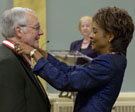 The essential crux of the issue here was nicely summarized by the opening sentences in a James Travers article, called “What Harper wants in a governor general,” in the Toronto Star on October 7: “Michalle Jean once joked that Paul Martin chose her as governor general because she’s hot.’ It’s not so funny now that Stephen Harper has her on ice … There’s trouble at court in the peaceable kingdom. A de facto head of state widely seen as refreshingly vibrant, Conservatives view more narrowly as just another Liberal mistake.”
The essential crux of the issue here was nicely summarized by the opening sentences in a James Travers article, called “What Harper wants in a governor general,” in the Toronto Star on October 7: “Michalle Jean once joked that Paul Martin chose her as governor general because she’s hot.’ It’s not so funny now that Stephen Harper has her on ice … There’s trouble at court in the peaceable kingdom. A de facto head of state widely seen as refreshingly vibrant, Conservatives view more narrowly as just another Liberal mistake.”
Ordinarily, this might not matter all that much in the real world of practical Canadian politics – just like the early 21st century ceremonial office of Governor General of Canada itself. Yet, whether they know it or not (or even care) Canadians today are not living in ordinary times. (When are they ever, of course, in living memory, but that is a matter for another day.)
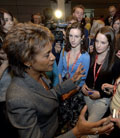 More exactly, Canadians today are living in times so strange that they might actually trigger the Governor General of Canada’s rarely used constitutional power, and responsibility, to be what George W. Bush would call “the decider” of last resort, in federal elections where the subtly expressed will of the Canadian people has made it unclear just which leader of which of the now five federal political parties has the best chance of forming some more or less stable minority government.
More exactly, Canadians today are living in times so strange that they might actually trigger the Governor General of Canada’s rarely used constitutional power, and responsibility, to be what George W. Bush would call “the decider” of last resort, in federal elections where the subtly expressed will of the Canadian people has made it unclear just which leader of which of the now five federal political parties has the best chance of forming some more or less stable minority government.
In fact, this is a quite unusual prospect – and no doubt remains a less than 50% or even 25% probability even in Canada’s current fractious (if also probably not at all that fragile) political circumstances. In the entire 139-year history of the present confederation to date, the situation has only arisen once before. This was in the quaintly notorious “King-Byng Constitutional Crisis” of 1926, the revelation of whose intimate details can still provoke staggering gales of sophomoric laughter among Canadian university students from sea to sea.
The more deadly serious question today …
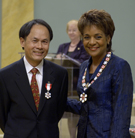 It is all very well to see Canadian political history as primarily a source of learned amusement in dreary political science classrooms, desperate for flashes of vivid human life. (Canada’s history is as dull as ditch water, as the old agrarian democrats said, and its politics are full of it, etc.)
It is all very well to see Canadian political history as primarily a source of learned amusement in dreary political science classrooms, desperate for flashes of vivid human life. (Canada’s history is as dull as ditch water, as the old agrarian democrats said, and its politics are full of it, etc.)
The question of just who might today become minority prime minister in (or even before) the next Canadian federal election, as early as next year on some accounts, is a more deadly serious matter, not to be treated so lightly. Especially if you are the kind of deadly serious politician in office that new Conservative Prime Minister Stephen Harper is proving to be.
Moreover, as the cards in this game are currently dealt, anyone in Mr. Harper’s position has every good reason to be concerned about Governor General Michaelle Jean.
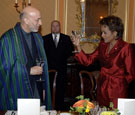 He is a Conservative. She was appointed by an earlier Liberal prime minister.
He is a Conservative. She was appointed by an earlier Liberal prime minister.
In the brave new world of successive minority Canadian Liberals and Conservatives, 20042006, Mr. Harper would not be doing his job if he failed to take some account of the prospect that in any future contest over who is to form a minority government – after an unclear, say, 2007 election in which, say, Liberals and Conservatives won identical numbers of seats (and arrange the other smaller deck chairs as you will) – the excellent Mme Jean is likely enough to prefer the Liberals who appointed her in the first place.
(Some have even raised the prospect that Governor General Jean – taking a leaf from the late Lord Byng’s 1926 playbook – might even rebuff any attempt by Prime Minister Harper to call yet another federal election too soon, the most recent still being little more than eight months ago. But given the current allocation of seats in Parliament, this would probably require the Bloc Quebecois and the Liberals to co-operate in an alternative minority government, which does not seem too likely. In any case there does not now seem any serious prospect of another federal election before the spring of 2007, at the earliest. And maybe that is not really too soon.)
What is to be done?
 As James Travers has noted in his Star article, in the end there is not “much a prime minister can do beyond a budget squeeze to discipline a governor general.”
As James Travers has noted in his Star article, in the end there is not “much a prime minister can do beyond a budget squeeze to discipline a governor general.”
Yet, based on what Mr. Travers more diplomatically reports, the Conservative Prime Minister Harper is certainly making clear to the Liberal-appointed Mme Jean that he is certainly not going to be taking it lightly, if she ever does feel called upon by others to exercise her constitutional reserve power in a way that redounds to Mr. Harper’s disadvantage.
To start with, Mr. Harper himself is apparently virtually ignoring the customary courtesies of at least informing the governor general about what her government is doing. As James Travers says, he has put the hot Mme Jean “on ice.”
 Then, to sweeten (or perhaps it should be embitter) the pot, some close to Mr. Harper are discreetly complaining to all who will listen that the governor general is indulging in too much inappropriate “political meddling,” for a proper non-partisan representative of the Crown in Canada’s traditional constitutional monarchy.
Then, to sweeten (or perhaps it should be embitter) the pot, some close to Mr. Harper are discreetly complaining to all who will listen that the governor general is indulging in too much inappropriate “political meddling,” for a proper non-partisan representative of the Crown in Canada’s traditional constitutional monarchy.
However just these complaints may or may not be (see the interim report card on the excellent Mme Jean below), this kind of prime ministerial guerilla warfare is probably about as far as Mr. Harper can go, in trying to protect his own immediate future in a still quite volatile political climate, as best he can.
Yet the more interesting somewhat longer-term question is whether the new Harper government will also be taking the recent advice of Mme Jean’s predecessor, Mme Adrienne Clarkson, and Canada’s leading news magazine, Maclean’s, to reform the current method of selecting a governor general, so that both future prime ministers and the Canadian people will not face quite the problem that Prime Minister Harper is facing now? (When Canada has developed into a considerably more free and democratic and independent place than it was in the roaring Canadian 1920s of King and Empire and King and Byng.)
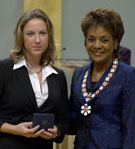 As an editorial somewhat misleadingly called “It’s time to vote for the Governor General” in the September 25 issue of Maclean’s puts it: “Mme. Clarkson suggests that the selection of a governor general should be subject to public review and ratification by Parliament. Under her proposal, the prime minister would put a name before a parliamentary committee which would consider the candidate’s suitability for the position …
As an editorial somewhat misleadingly called “It’s time to vote for the Governor General” in the September 25 issue of Maclean’s puts it: “Mme. Clarkson suggests that the selection of a governor general should be subject to public review and ratification by Parliament. Under her proposal, the prime minister would put a name before a parliamentary committee which would consider the candidate’s suitability for the position …
“The committee’s recommendation would then be put to a vote in Parliament. If approval is granted, the prime minister, preferably with the support of the leader of the Opposition, would submit the name to the Crown for technical approval as required by our Constitution. At present, the prime minister pulls a name out of the air and submits it to the Queen for approval without any formal review or consultation.”
Western and other populist opposition to Mme Clarkson’s “minimalist” formula …
 The September 25 Maclean’s editorial ends on an especially intriguing note: “One of the early hallmarks of the government of Stephen Harper is its commitment to democratize Canada’s governmental institutions. Nominees to the Supreme Court are now subject to review before a parliamentary committee … Mr. Harper recently revealed his intention to hold elections to fill vacant seats in the Senate …
The September 25 Maclean’s editorial ends on an especially intriguing note: “One of the early hallmarks of the government of Stephen Harper is its commitment to democratize Canada’s governmental institutions. Nominees to the Supreme Court are now subject to review before a parliamentary committee … Mr. Harper recently revealed his intention to hold elections to fill vacant seats in the Senate …
“As Mme. Clarkson says [in proposing her vote for the governor general’ reform], perhaps too kindly, the system isn’t broke, but it could still do with fixing.’ Given the various reforms already on the government’s agenda, this particular fix seems the next logical step.”
It is easy to agree with all this – in at least one ultimate sense. The Governor General of Canada today is not selected the way he (invariably) was back at the beginning in 1867, and for as long as three-quarters of a century after that. The current practice of having the Prime Minister of Canada alone appoint the governor general – as opposed to the Government of the United Kingdom, as at the start – evolved haphazardly in the 20th century, and without much forethought about its unintended consequences in certain possible if (hopefully nowadays?) rare situations.
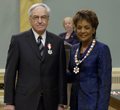 In their unusually fractious and regionally divided federal political scene of the early 21st century, Canadians have at last bumped into just such a rare practical situation. It is now clear enough that the current selection method for today’s “de facto head of state” really ought to be improved, to strengthen the legitimacy and credibility of the governor general, when he or she does have to exercise the continuing “reserve powers” of the office. And reform of just this sort is now being urged by a (whatever else) constitutionally and politically savvy former governor general, in a provocative new book of memoirs.
In their unusually fractious and regionally divided federal political scene of the early 21st century, Canadians have at last bumped into just such a rare practical situation. It is now clear enough that the current selection method for today’s “de facto head of state” really ought to be improved, to strengthen the legitimacy and credibility of the governor general, when he or she does have to exercise the continuing “reserve powers” of the office. And reform of just this sort is now being urged by a (whatever else) constitutionally and politically savvy former governor general, in a provocative new book of memoirs.
At the same time, there are reasons to doubt that, in the real world of Canadian politics today, Prime Minister Harper will finally be going quite so far as to take the advice that both Mme Clarkson and Maclean’s have so aptly offered.
One of the most interesting of these reasons turns around what Australians would call Mme Clarkson’s highly “minimalist” approach to reforming the office of the de facto head of state in a former self-governing British dominion. And the main trouble is that it is just not democratic enough, for many especially Western but also other surviving old Canadian populists and others (for want of better words), who in at least their more right-wing incarnations still form an important enough part of Mr. Harper’s political base.
 In the free and democratic society nowadays, that is to say (as even constitutionally signaled in Pierre Trudeau’s Constitution Act 1982, e.g. with its Canadian Charter of Rights and Freedoms), there are those who will urge that if the Governor General of Canada actually does have such quite important (even if rarely ever used) constitutional powers as is now apparently the case, the only seriously legitimate way of filling the office in the increasingly democratic 21st century is through direct popular election.
In the free and democratic society nowadays, that is to say (as even constitutionally signaled in Pierre Trudeau’s Constitution Act 1982, e.g. with its Canadian Charter of Rights and Freedoms), there are those who will urge that if the Governor General of Canada actually does have such quite important (even if rarely ever used) constitutional powers as is now apparently the case, the only seriously legitimate way of filling the office in the increasingly democratic 21st century is through direct popular election.
(Thus a reforming comment writer on an October 6 web column by the irrepressible Rafe Mair from BC, to take just one of many possible examples, appeals for both “regional representation … via an effective Senate” and “an elected head of state via one vote per citizen of Canada.”)
What will happen to the so-called Canadian monarchy at the end of the reign of the present good Queen?
 Viewed as just an abstract proposition, you might think that there could be some good practical political reasons for Stephen Harper to actually do Mme Clarkson and Maclean’s magazine one better, and give all Canadians and not just Members of Parliament in Ottawa an opportunity (as the headline on the September 25 Maclean’s editorial says) “to vote for the Governor General.”
Viewed as just an abstract proposition, you might think that there could be some good practical political reasons for Stephen Harper to actually do Mme Clarkson and Maclean’s magazine one better, and give all Canadians and not just Members of Parliament in Ottawa an opportunity (as the headline on the September 25 Maclean’s editorial says) “to vote for the Governor General.”
Assuming, e.g., that Mr. Harper is still prime minister when it is time to appoint a replacement for Mme Jean in September 2010, why couldn’t he just hold the same kind of popular election for the office of governor general that he apparently intends to hold for all future appointments he may make to the Senate of Canada?
(And on the Stephen Harper theory of “step-by-step” Senate reform – which does seem a rather plausible one when you think the great unwritten traditions of Canada’s parliamentary democracy through – as federal prime minister he can ultimately hold such “advisory” elections, without any need for troublesome things like constitutional amendments or the approval of provincial governments. And who said Stephen Harper was no admirer of Pierre Trudeau?)
 A popularly elected de facto head of state of this sort would please the especially Western but also other surviving old Canadian populists and others who, for the moment at least, probably play a more important role in Stephen Harper’s Conservative Party of Canada than in any other current Canadian political party (with the possible partial exception of the Bloc Quebecois?) It would also give Mr. Harper an enhanced profile as a man of the people (as opposed to a man of the regional oil barons in Calgary) – a useful thing for anyone who hopes to remain prime minister of Canada for any length of time.
A popularly elected de facto head of state of this sort would please the especially Western but also other surviving old Canadian populists and others who, for the moment at least, probably play a more important role in Stephen Harper’s Conservative Party of Canada than in any other current Canadian political party (with the possible partial exception of the Bloc Quebecois?) It would also give Mr. Harper an enhanced profile as a man of the people (as opposed to a man of the regional oil barons in Calgary) – a useful thing for anyone who hopes to remain prime minister of Canada for any length of time.
Alas, down on the ground, there is another more decisive practical political problem with this buoyant populist scenario.
The problem is not, it is probably worth stressing, that having a popularly elected head of state would finally turn the Canadian confederation today into a US-style presidential government, in defiance of its 139-year history as a British-style parliamentary government (as some like to foolishly argue). The former self-governing British dominion of Ireland, e.g. – originally modeled on Canada, according to the British empire historian John Bowle – nowadays has a popularly elected head of state, who plays about the same role in today’s Irish parliamentary democracy that the governor general plays in today’s Canadian parliamentary democracy.
 At the same time, in at least the murky realms of an increasingly opaque political symbolism, there is what some at least see as one big difference between the Irish and Canadian parliamentary democracies today. Ireland nowadays is a “republic,” while Canada is still a “constitutional monarchy” which in theory continues to bear some kind of (albeit extremely vague) allegiance to the British monarch, Queen Elizabeth II. (Even after the Constitution Act 1982, which finally cut the last remaining practical legal and constitutional ties between the Government of Canada and the Government of the United Kingdom.)
At the same time, in at least the murky realms of an increasingly opaque political symbolism, there is what some at least see as one big difference between the Irish and Canadian parliamentary democracies today. Ireland nowadays is a “republic,” while Canada is still a “constitutional monarchy” which in theory continues to bear some kind of (albeit extremely vague) allegiance to the British monarch, Queen Elizabeth II. (Even after the Constitution Act 1982, which finally cut the last remaining practical legal and constitutional ties between the Government of Canada and the Government of the United Kingdom.)
Reforming the current selection method for the office of Governor General of Canada in the “minimalist” way proposed by Mme Clarkson and Maclean’s magazine could probably be done without really raising the question of the future of the British monarchy in Canada. A governor general “elected” by the Queen’s Parliament of Canada can probably still be thought of as somehow ultimately accountable to the Queen, without doing too much violence to anyone’s conception of logical entailment.
A governor general elected by the Canadian people, however, is rather clearly ultimately accountable to the Canadian people, whatever residual legal technicalities may remain. And if such a governor general actually is in place at the end of the reign of the good Queen Elizabeth II, it would seem virtually certain that the British monarchy will one way or another come to an end in Canada at that same point in time. (Not quite as it did in Ireland perhaps, but similarly all the same – as will also ultimately no doubt he happening in such places as Australia, Jamaica, and New Zealand too, and as has already happened in India and South Africa.)
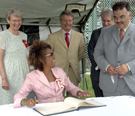 The problem for Stephen Harper here is that his new Conservative Party of Canada is still, in effect, an alliance of somewhat strange bedfellows. One the one hand there is the old Reform Party of Preston Manning (who reliable evidence has it was and is certainly no Canadian monarchist).On the other there is the old Progressive Conservative Party last led to office by Brian Mulroney. (This was the last great partisan political bastion of the old-time Canadian monarchist gospel – which also protested the change from the British Canadian red ensign to today’s independent Canadian maple leaf flag in 1965). And one price of this alliance has been a written plank in the constitution of the new Conservative Party that stands up boldly for the future of the old British monarchy in Canada.
The problem for Stephen Harper here is that his new Conservative Party of Canada is still, in effect, an alliance of somewhat strange bedfellows. One the one hand there is the old Reform Party of Preston Manning (who reliable evidence has it was and is certainly no Canadian monarchist).On the other there is the old Progressive Conservative Party last led to office by Brian Mulroney. (This was the last great partisan political bastion of the old-time Canadian monarchist gospel – which also protested the change from the British Canadian red ensign to today’s independent Canadian maple leaf flag in 1965). And one price of this alliance has been a written plank in the constitution of the new Conservative Party that stands up boldly for the future of the old British monarchy in Canada.
So … If Prime Minister Harper tries to take the minimalist approach to reforming the selection of the governor general that Mme Clarkson and Maclean’s magazine recommend, he will irritate certain important old democratic populist reformers in his new party. If, on the other hand, he tries to please them by taking the bolder approach of popularly electing the governor general, he will deeply offend certain important old conservatives in his ranks, and arguably even violate his party’s constitution.
As the great spirit of Canada’s longest-lived federal prime minister William Lyon Mackenzie King would no doubt advise, the best course in such a situation is finally to do nothing at all. (This has to no small extent been the Canadian way, some would say. And in Canada at least the old-school Conservatives are always loyal to the past. It’s just the present and the future they have trouble with. )
An interim report card on the excellent Mme Jean
 Meanwhile, what is to become of the current “trouble at court in the peaceable kingdom” that James Travers has written about in the Toronto Star – the lingering bad vibrations between the Conservative Prime Minister Harper and the Liberal-appointed Governor General Jean?
Meanwhile, what is to become of the current “trouble at court in the peaceable kingdom” that James Travers has written about in the Toronto Star – the lingering bad vibrations between the Conservative Prime Minister Harper and the Liberal-appointed Governor General Jean?
Much of what some at least would see as great further fascination could no doubt be said on this subject. Both protagonists can be seen as reflections of intriguing and possibly even important trends in conflict in Canada today. But my discussion here also needs to end very soon.
The best advice for the moment probably is the note Mr. Travers finally lands on in his October 7 column: “Cooler heads should prevail … well before current tension becomes future animosity. Conservatives should recognize that a modern face is just what a tired monarchy needs, and the Governor General should pilot the most distant course possible from partisan politics.”
At the same time, it is probably worth bearing a few other things in mind as well. As just a few quick examples:
* Regardless of how she was selected, the excellent Mme Jean has been, as Mr. Travers says, “widely seen as refreshingly vibrant” among significant numbers of Canadians in various parts of the country.
* Probably significant numbers among the 63.7% of the interested Canadian people who did not vote for Stephen Harper and the new Conservative Party of Canada on January 23, 2006 will not be unhappy to hear that there is some tension between Prime Minister Harper and Governor General Jean these days – and even that there is some prospect the governor general, along with the Parliament of Canada, might be able to act as some kind of check and balance on the minority prime minister, in certain circumstances, etc.
 * Whatever else may be in her background, Mme Jean does not really have a history of active (to say nothing of aggressive) partisanship for the Liberal Party of Canada. Both she and her predecessor Mme Clarkson have been in some ways unusual and refreshing appointments. For the growing numbers of Canadians who are not avid monarchists, it’s reasonable to hope that the precedents established by the appointments of Mme Clarkson and Mme Jean will at least help broaden the range of potential candidates whom Canadian federal (and provincial?) politicians might nominate to run for office as popularly elected de facto and de jure Canadian heads of state, once the reign of the present good Queen Elizabeth II ends. (Apart from anything else, how many Canadian people really want Charles III to be King of Canada? And remember: the British people already beheaded Charles I themselves.)
* Whatever else may be in her background, Mme Jean does not really have a history of active (to say nothing of aggressive) partisanship for the Liberal Party of Canada. Both she and her predecessor Mme Clarkson have been in some ways unusual and refreshing appointments. For the growing numbers of Canadians who are not avid monarchists, it’s reasonable to hope that the precedents established by the appointments of Mme Clarkson and Mme Jean will at least help broaden the range of potential candidates whom Canadian federal (and provincial?) politicians might nominate to run for office as popularly elected de facto and de jure Canadian heads of state, once the reign of the present good Queen Elizabeth II ends. (Apart from anything else, how many Canadian people really want Charles III to be King of Canada? And remember: the British people already beheaded Charles I themselves.)
* When you get right down to it and think it through, popularly electing what is currently known as the governor general of Canada (and future de jure as well as de facto head of state) – “via one vote per citizen of Canada,” on the present Irish parliamentary democratic model – is the only democratic reform of the selection method for the office that finally makes sense in the 21st century. Australia, e.g., is starting to face up to this prospect – after a stab at a more minimalist approach to essentially the same kind of reform that failed, in its 1999 republican referendum. Many would say that Australia is still quite far ahead of Canada on this front. But Australia still doesn’t really have a flag of its own, and Canada has. Who knows? One way or another, Canada may actually wind up having a popularly elected de facto head of state first too. (Even if you’d of course still be hard-pressed to find too much hard evidence of this prospect … yet.)
 Meanwhile, if you still want to know more about just how Mme Jean has really done during her first year in office, the best thing I ran across in my research on the web for this piece is an article by Stephen Maher of the Halifax Chronicle Herald, called “Ms. Jean has yet to break Canada’s two solitudes.” You could also check out “Harper doesn’t agree with Jean that Quebecers are disconnected“; “Jean is right … Canadians should mingle more“; “Governor General believes more domestic travel could draw Canadians together“; and “Jean defends Afghanistan mission.”
Meanwhile, if you still want to know more about just how Mme Jean has really done during her first year in office, the best thing I ran across in my research on the web for this piece is an article by Stephen Maher of the Halifax Chronicle Herald, called “Ms. Jean has yet to break Canada’s two solitudes.” You could also check out “Harper doesn’t agree with Jean that Quebecers are disconnected“; “Jean is right … Canadians should mingle more“; “Governor General believes more domestic travel could draw Canadians together“; and “Jean defends Afghanistan mission.”
And if you want to chat briefly with the excellent Governor General Jean yourself, you might be able to manage it on her new internet chat and dialogue site, http://www.citizenvoices.gg.ca/en/ (if it doesn’t wind up getting shut down as a result of funding cutbacks, that is, because it’s another thing that Prime Minister Harper doesn’t like).

